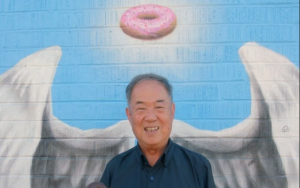THE DONUT KING: 3 ½ STARS. “isn’t all sweet but it is a treat.”
 COVID-19 has forced film distributors to get creative. Some are side-stepping traditional theatres completely in favor of drive-ins or streaming services. Other movies they release to iTunes and there’s even a resurgence in direct to DVD titles.
COVID-19 has forced film distributors to get creative. Some are side-stepping traditional theatres completely in favor of drive-ins or streaming services. Other movies they release to iTunes and there’s even a resurgence in direct to DVD titles.
“The Donut King,” a new rags-to-riches-to-rags documentary from director Alice Gu may have the most unique release plan yet. Its distributor, Films We Like, is making the doc available to stream via top artisan donut (or, doughnut) shops across Canada. Each purchase of a stream, the press release says, “will help support these local purveyors of sweetness.”
Ted Ngoy is not a name you will recognize, but his influence in California is immeasurable. A refugee from the genocide in Cambodia, he relocated to Los Angeles in 1975 looking for a better life. “I could choose any country,” he says. “But I chose America because I love America.” After a series of odd jobs he enrolled in the three month training program at Winchell’s Donut House. A good student he absorbed everything about the business and soon went out on his own. “It was kind of ironic,” says food journalist Greg Nichols. “They trained the enemy.”
Within four years he had 25 donut shops and would soon build an empire of 65 stores so pervasive it kept Dunkin’ Donuts out of the L.A. marketplace. “It spread like wildfire,” he says. He was a self-made millionaire who lived a high life, made $100,000 a month and lived in a giant mansion, complete with a chandelier that wouldn’t be out of place in Versailles and an elevator. “My parents enjoyed the fruits of their labor,” says one son.
Ngoy had the trappings of wealth but also used his money to sponsor and mentor thousands of other Cambodian refugees. It is estimated that almost 90% of all the donuts sold in California are made by Cambodian immigrants who can trace their businesses back to the Donut King.
His great success, however, was followed by a great fall as his American Dream becomes a nightmare.
“The Donut King” isn’t all sweet but it is a treat. The detailed background accounts of the fall of Phnom Penh and the Khmer Rouge are wrenching and Ngoy’s fall from grace, having thrown away the family’s business and money, is shocking. “It’s a monster in me,” he says of his gambling addiction. “The more you chase, the more it is gone.”
Gu presents the downfall effectively with a series of fast cut talking head style interviews with fiends and family. By the time they sell the last donut shop for $85,000 in cash—which goes missing—the story functions as a cautionary tale of unchecked ambition.
By the end “The Donut King” takes a more traditional approach, winding things up with a Food Network style wrap up that tells the story of the next generation of Donut Kings and Queens. It’s an uplifting end to a story with more flavours than your corner donut shop.
